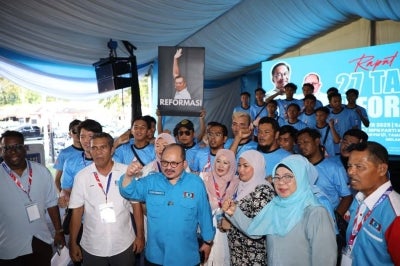Struggling with worker shortage, service industry still reeling from effects of pandemic, says experts

SHAH ALAM - The service industry has been receiving a big hit last year due to Covid-19 and there have been concerns over the possibility of the ‘Great Resignation’ - a year when workers quit their jobs at historic rates in the US, to happen in Malaysia as well.
The service workers have been overworked and many of them are considering leaving the industry as the rate of workers in the industry continues to decline last year.
Universiti Kuala Lumpur Business School economic analyst, Professor Dr Aimi Abdul Rashid stated that the service industry is still in the process of recovery, especially after the impact of Covid-19 and the previous implementation of Movement Order Control (MCO).
According to him, the unemployment rate in Malaysia reached its highest in May 2020 at 5.3% and has since cascaded to 4.3% as of Nov 2021.
He stated that employers are taking their time to recoup their working capital and capital expenditure to restart their businesses, which may cause them to be cautious to hire more workers and explains the excessive workload experienced by the existing workers.
“Not only are the employers still recouping to restart their businesses, the speed of recovery is also under threat by the Omicron, so they are very cautious in their investment.
“It is like a chicken and egg situation, employers will be willing to hire new staff if the business picks up, however, they are cautious as they suffered massive losses during the MCOs,” he told Sinar Daily.
Malaysian Trades Union Congress (MTUC) deputy president, Mohd Effendy Abdul Ghani said that MTUC is of the view that the ‘Great Resignation’ is unlikely to happen on a large scale but what will happen is the expectation of jobs and employers will change.
He explained that there is a possibility of people quitting their jobs to change to the new norm of working from home after going through several phases of the MCO and also the recovery phase of the country, which means that the service industry might not be a priority since they wanted to work remotely.
“After almost 2 years of this situation, the habit and tendency to continue working from home has existed.
“Some started to enjoy the freedom and autonomy from remote working as they were no longer required to drive or travel via public transport to reach their respective working destinations,” he said when contacted by Sinar Daily.
More than that, he said the employees will expect the increase of the minimum wage and the Government is not only obliged to increase the minimum wage for a particular sector but also for all employees in Malaysia, including Sabah and Sarawak in any field of employment and sector.
“It needs to be adjusted because when the price of basic goods and groceries increases, all Malaysians will be affected.
“Therefore, the increase in the minimum wage must be adjusted and MTUC's recommendation is RM1500 per month with a COLA (Cost of Living Adjustment) of RM300.00 per month,” he said.
Weighing in on the matter is also Malaysian Employers Federation (MEF) executive director, Datuk Shamsuddin Bardan who stated that it is not possible for the "Great Resignation" to occur here as there is a vast work culture difference here compared to the US.
However, he acknowledges worker shortages, especially in the service sector, especially those working in the food and beverage industry.
He said that some employees in the industry decided not to return to work due to Covid-19 fears.
Shamsudin however said employers need to come up with new ideas to overcome issues of worker shortage in their respective industries.
“With the current situation we are in, I think there is a need for the employers in the sector to review how they operate.
“I have seen quite a number of establishments using the latest technology to try to overcome the shortage of manpower, for example, you can now order just using your smartphone when you are in the restaurant and I think that is a good way to at least reduce the workload of their workers,” he said.
MEF also recommend for employers be more agile and look closely at the needs of the employees such as flexible work arrangements.
On minimum wage, Shamsudin stated that the wages set should instead act as a guideline and should also include factors such as employee experience and skill rather than mandating employers to pay the minimum amount.
Shamsudin opined that minimum wage is often targeted at low skilled labour however advised Malaysian employees to reskill or skill up to gain higher pay.
Download Sinar Daily application.Click Here!















